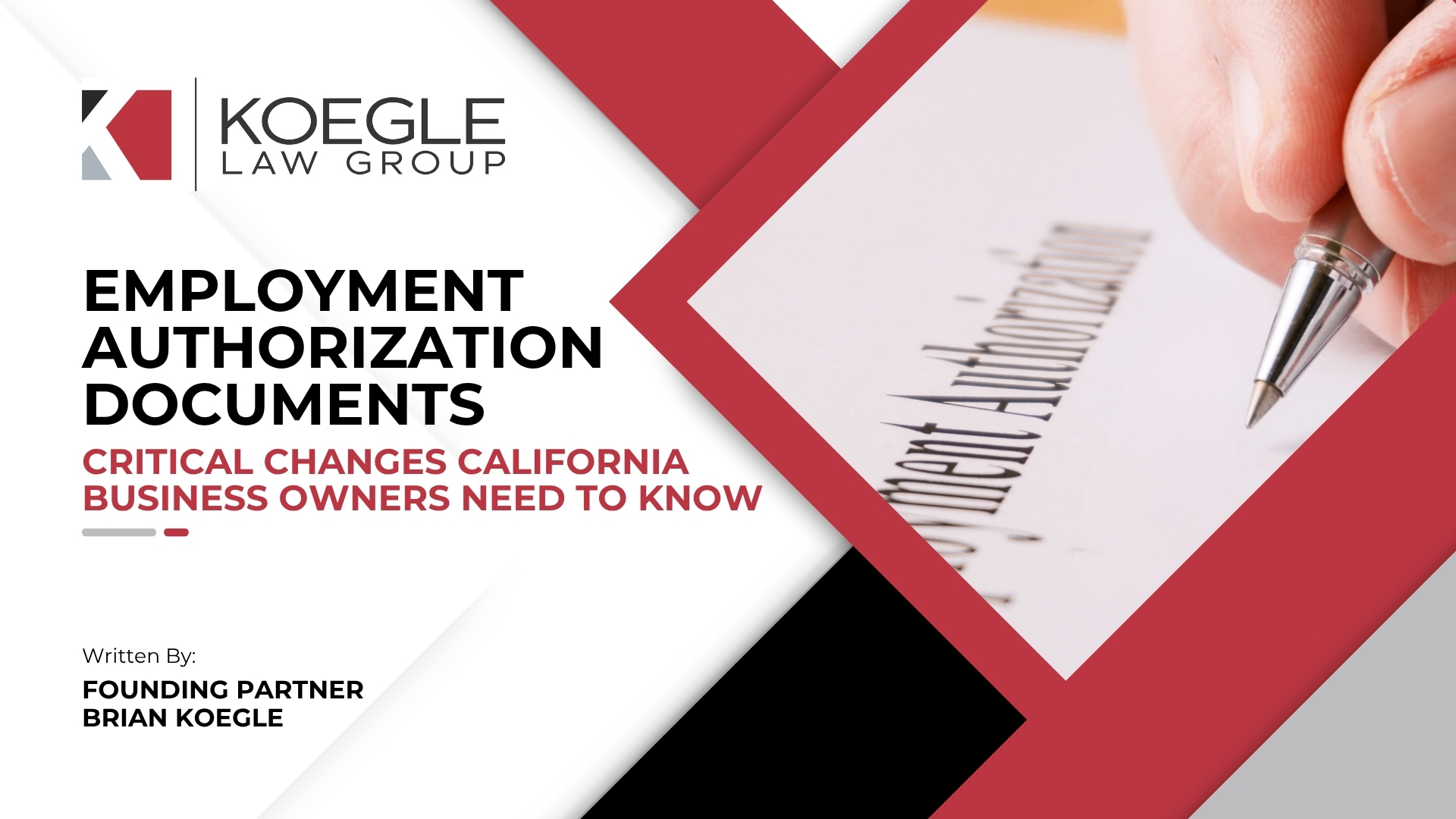Written by Founding Partner, Brian Koegle | Koegle Law Group
If your California business employs foreign national workers with Employment Authorization Documents (EADs), significant changes are now in effect that will directly impact your operations and labor force. Effective immediately, the U.S. Citizenship and Immigration Services (USCIS) has eliminated the automatic extension of work permits for most renewal applicants, a shift that will require immediate attention from employers across the state.
Understanding the New Rule
On October 30, USCIS published an interim final rule that fundamentally changes how employment authorization renewals are handled. Previously, certain EAD holders who filed for renewals received automatic extensions of up to 540 days, allowing them to continue working legally while USCIS processed their applications through a significant backlog. This safety net has now been removed.
Under the new policy, workers applying for renewed work authorization must wait for USCIS to complete its adjudication and issue a new EAD before they can continue employment after their current card expires. The rule does include limited exceptions, such as extensions provided by law or through Federal Register notices for employment documentation related to temporary protected status. Additionally, any EADs that were automatically extended before October 30 remain valid under the previous rules.
Why USCIS Made This Change
The agency’s reasoning centers on security and fraud prevention. According to USCIS, the automatic extension process granted employment authorization benefits without completing eligibility determinations, vetting and screening checks, or resolving potential derogatory information. The agency expressed concern that workers could obtain automatic extensions despite information that might flag them as national security or public safety risks. By requiring full adjudication before granting renewed work authorization, USCIS believes it can more effectively deter fraud and ensure more frequent vetting of foreign national workers.
The Scale of Impact
The numbers tell an important story about how widespread this change will be. Each year, approximately 450,000 workers apply for EAD extensions, while USCIS processes roughly 49,000 applications monthly. With processing times often unpredictable and premium processing or expedited review unavailable for most employment authorization categories, even workers who file their renewal applications at the earliest opportunity (up to six months in advance) may experience gaps in their work authorization.
What This Means for Your Business
California employers should prepare for more frequent disruptions to employee work authorization. Without the automatic extension safety net, timing becomes critical. USCIS recommends that workers file renewal applications up to 180 days before their EAD expires, but even this early filing may not prevent authorization gaps given current processing backlogs.
With increases in federal enforcement of these authorizations, every California business will need to track expiration dates more carefully than ever before. Employees who experience lapses in employment authorization cannot legally work during those gaps, even if their underlying immigration status remains valid. It’s important to understand that work authorization is separate from immigration status itself. An EAD does not grant lawful presence in the United States, and losing work authorization does not mean a loss of legal status. However, it does mean that affected employees cannot work until their new EAD is issued, without significant risk to both the employee (potential denial of the extension and/or removal) and the employer (significant administrative penalties and fines).
Who Needs an EAD?
Not all foreign national workers require EADs to work legally in the United States. Those who do need them include workers applying for adjustment of status and H-4 spouses of H-1B visa holders, among others. If you employ workers in these categories, you should be particularly attentive to upcoming expiration dates.
Action Steps for California Employers
First, implement a robust tracking system for monitoring EAD expiration dates. Given the unpredictable nature of processing times, you should begin communicating with affected employees well in advance of their expiration dates, encouraging them to file renewals as early as possible. The employee should provide a copy of the extension application to the employer to assist the employer in further tracking of this process.
Second, update your training and standard operating procedures for both onboarding new employees and reverifying work authorization for current employees. Team members responsible for completing Form I-9 must understand the new rules to ensure your business remains compliant. Without proper tracking and understanding of current requirements, your company could inadvertently allow unauthorized workers to continue employment or, conversely, could unnecessarily terminate employees who remain authorized to work.
Third, consider implementing earlier reminder systems for employees who need to reverify their work authorization. Rather than waiting until closer to expiration dates, begin the conversation with employees earlier (e.g. six months prior to expiration) to ensure they have maximum time to complete the renewal process.
Legal experts anticipate that this rule will face court challenges, which could potentially modify or delay its implementation. However, California business owners should plan according to the current requirements while staying informed about any legal developments that might affect the policy.
The elimination of automatic EAD extensions represents a significant shift in employment authorization procedures, and places even further burdens on employers to act proactively in ensuring their workforce can continue working legally. By taking steps now, your business can minimize disruptions while maintaining compliance with federal immigration employment requirements.
Looking for a trusted legal partner for your business?
Contact Koegle Law Group to schedule a consultation and see how our team can help you navigate your employment and business law needs with confidence..

Disclaimer: This article is for informational purposes only and is not intended to replace legal advice. Employers should consult with qualified immigration attorneys regarding their specific situations and compliance obligations.
